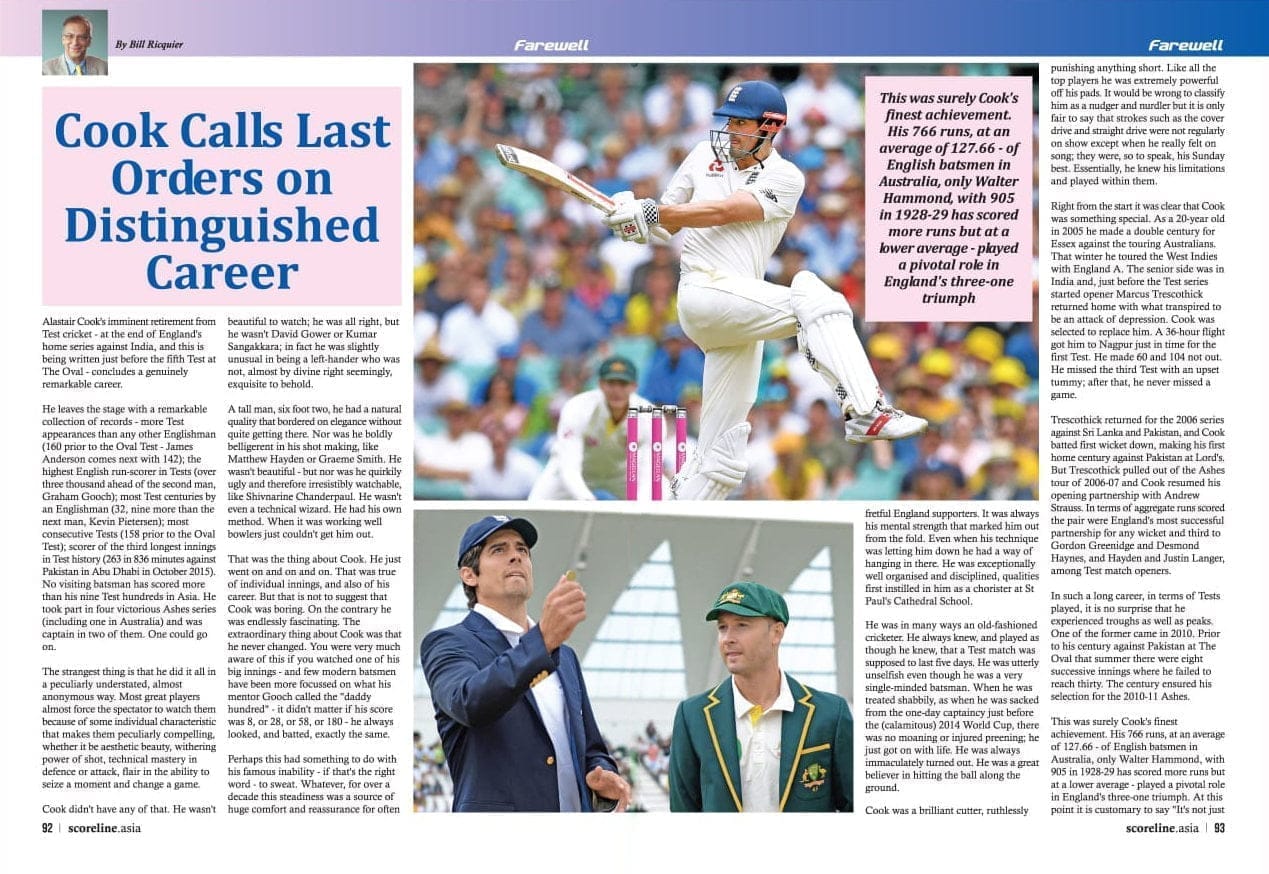Alastair Cook’s imminent retirement from Test cricket – at the end of England’s home series against India, and this is being written just before the fifth Test at The Oval – concludes a genuinely remarkable career. He leaves the stage with a remarkable collection of records – more Test appearances than any other Englishman (160 prior to the Oval Test – James Anderson comes next with 142); the highest English run-scorer in Tests (over three thousand ahead of the second man, Graham Gooch); most Test centuries by an Englishman (32, nine more than the next man, Kevin Pietersen); most consecutive Tests (158 prior to the Oval Test); scorer of the third longest innings in Test history (263 in 836 minutes against Pakistan in Abu Dhabi in October 2015). No visiting batsman has scored more than his nine Test hundreds in Asia. He took part in four victorious Ashes series (including one in Australia) and was captain in two of them. One could go on.
The strangest thing is that he did it all in a peculiarly understated, almost anonymous way. Most great players almost force the spectator to watch them because of some individual characteristic that makes them peculiarly compelling, whether it be aesthetic beauty, withering power of shot, technical mastery in defence or attack, flair in the ability to seize a moment and change a game. Cook didn’t have any of that. He wasn’t beautiful to watch; he was all right, but he wasn’t David Gower or Kumar Sangakkara; in fact he was slightly unusual in being a left-hander who was not, almost by divine right seemingly, exquisite to behold. A tall man, six foot two, he had a natural quality that bordered on elegance without quite getting there. Nor was he boldly belligerent in his shot making, like Matthew Hayden or Graeme Smith. He wasn’t beautiful – but nor was he quirkily ugly and therefore irresistibly watchable, like Shivnarine Chanderpaul. He wasn’t even a technical wizard. He had his own method. When it was working well bowlers just couldn’t get him out.

That was the thing about Cook. He just went on and on and on. That was true of individual innings, and also of his career. But that is not to suggest that Cook was boring. On the contrary he was endlessly fascinating. The extraordinary thing about Cook was that he never changed. You were very much aware of this if you watched one of his big innings – and few modern batsmen have been more focussed on what his mentor Gooch called the “daddy hundred” – it didn’t matter if his score was 8, or 28, or 58, or 180 – he always looked, and batted, exactly the same. Perhaps this had something to do with his famous inability – if that’s the right word – to sweat. Whatever, for over a decade this steadiness was a source of huge comfort and reassurance for often fretful England supporters. It was always his mental strength that marked him out from the fold. Even when his technique was letting him down he had a way of hanging in there. He was exceptionally well organised and disciplined, qualities first instilled in him as a chorister at St Paul’s Cathedral School.
He was in many ways an old-fashioned cricketer. He always knew, and played as though he knew, that a Test match was supposed to last five days. He was utterly unselfish even though he was a very single-minded batsman. When he was treated shabbily, as when he was sacked from the one-day captaincy just before the (calamitous) 2014 World Cup, there was no moaning or injured preening; he just got on with life. He was always immaculately turned out. He was a great believer in hitting the ball along the ground.
Cook was a brilliant cutter, ruthlessly punishing anything short. Like all the top players he was extremely powerful off his pads. It would be wrong to classify him as a nudger and nurdler but it is only fair to say that strokes such as the cover drive and straight drive were not regularly on show except when he really felt on song; they were, so to speak, his Sunday best. Essentially, he knew his limitations and played within them.
Right from the start it was clear that Cook was something special. As a 20-year old in 2005 he made a double century for Essex against the touring Australians. That winter he toured the West Indies with England A. The senior side was in India and, just before the Test series started opener Marcus Trescothick returned home with what transpired to be an attack of depression. Cook was selected to replace him. A 36-hour flight got him to Nagpur just in time for the first Test. He made 60 and 104 not out. He missed the third Test with an upset tummy; after that, he never missed a game.
Trescothick returned for the 2006 series against Sri Lanka and Pakistan, and Cook batted first wicket down, making his first home century against Pakistan at Lord’s. But Trescothick pulled out of the Ashes tour of 2006-07 and Cook resumed his opening partnership with Andrew Strauss. In terms of aggregate runs scored the pair were England’s most successful partnership for any wicket and third to Gordon Greenidge and Desmond Haynes, and Hayden and Justin Langer, among Test match openers.
In such a long career, in terms of Tests played, it is no surprise that he experienced troughs as well as peaks. One of the former came in 2010. Prior to his century against Pakistan at The Oval that summer there were eight successive innings where he failed to reach thirty. The century ensured his selection for the 2010-11 Ashes.
This was surely Cook’s finest achievement. His 766 runs, at an average of 127.66 – of English batsmen in Australia, only Walter Hammond, with 905 in 1928-29 has scored more runs but at a lower average – played a pivotal role in England’s three-one triumph. At this point it is customary to say “It’s not just about the numbers”, but it is impossible to ignore them. In the first Test at Brisbane he scored 67 and 235 not out, helping secure a draw that felt more like a win. And how many times have England started at the Gabba with a defeat. In an innings victory at Adelaide he made 148. At Perth he made 32 and 12, as England were demolished by Mitchell Johnson. In another innings victory at Melbourne he made 82. And in a third innings victory at Sydney he made 189.
The summer of 2011 started with one of his intermittent poor trots, but in the third Test against India the following summer he made his highest Test score of 294.
India itself was the scene of another of Cook’s great achievements when he led England to a rare series victory there in 2012-13. It was his first series in charge officially – he had deputised for Strauss in Bangladesh in 2009-10 and, inevitably, had scored hundreds in both Tests. In India, England were routed in the first Test at Ahmedabad but Cook scored a century in England’s second innings, moving his feet positively to the spinners. He made 176 in 556 minutes. England won the second Test at Mumbai by ten wickets, Cook making 122 in their first innings. England won the third Test, at Kolkata, by seven wickets. Cook suffered the mortification of being run out for 190 in the first innings; it was a peculiarly unusual experience for him, being the first time he had ever been run out in first-class cricket. That in itself is a comment on his level of common sense and concentration. Oddly enough, he suffered a bizarre dismissal in the second innings too, being stumped in the first over of the innings, only the second time that had happened in Test history.
It was inevitable that Cook would captain England and his start could hardly have been better, an Ashes victory coming soon after the Indian one. There was another Ashes win in 2015 and an away win over a fine South African side in 2015-16. Cook’s personal qualities meant that he always had the unwavering support and respect of his side, but he had a stubborn approach and sometimes lacked tactical flexibility; as the highly accomplished side put together by Strauss and Andy Flower gradually disintegrated things became more difficult. By the time of the winter tours of Bangladesh and India in 2016-17 it was clear that he had had enough.
The low point must surely have been the Ashes whitewash of 2013-14. Johnson was a literally irresistible force. Senior players Jonathan Trott, Graeme Swann and Matt Prior disappeared from the scene for a variety of reasons. There was nothing the captain could have done.
Of course the easiest thing for Cook to have done was to give up the captaincy. But it has never been Cook’s way to do the easy thing. He carried on, losing a home series to Sri Lanka, and getting involved – through no fault of his own – in the embarrassing brouhaha that led to Pietersen’s exclusion from the England set-up. Cook has more or less confirmed that he was hung out to dry by the England and Wales Cricket Board (ECB). Redemption came soon enough in the form of a convincing win over India, after losing the first Test.
It has been a struggle since he went back into the ranks in the summer of 2017. There were two massive double centuries (his 244 not out at Melbourne was his fifth – only Hammond, with seven, has scored more for England) but apart from them the cupboard was pretty bare. In some ways he has been a victim of the ECB’s determined effort to ruin the game’s domestic structure. Cook is one of those batsmen who needs time in the middle; when the only format available is Test match cricket that can be easier said than done. But it was clearly more than a loss of form that prompted the decision. His mental strength and the sheer hunger for runs, were no longer quite the same.
Where does he stand in the pantheon? That is not an easy question to answer. A career average of 44.88 puts him ahead of Gooch and David Gower (just) but behind Pietersen and Geoff Boycott. Of the top ten run-scorers in Tests, he is the only opener; that is remarkable. People used to say that he could break all the records if he kept going long enough. Even now, at the time of his going, people wonder at his longevity. And yet he is only 33. Nobody ever called Gooch a great Test batsman when he was 33; he reached his peak at 37.
Cook himself has said that he was not the most talented player around. Determination, will power, concentration, a simple love of batting almost for its own sake made him a great player. In every sense he became a fixture. It is genuinely astonishing that he missed just one Test between his debut and his retirement. That’s longevity.
And of course there was a tendency to take him for granted – not so much the public, with whom he was always popular, but rather the cricket establishment. Every time there was a dip in form there were calls in the media for him to be dropped. There is the curious case of Wisden’s Five Cricketers of The Year, the almanack’s accolade for outstanding achievement. (you can be chosen only once). Cook was chosen in 2012. Monty Panesar, who made his debut in the same game as Cook, was chosen in 2008. Stuart Broad, Chris Read, Trott, Graham Onions, Ryan Sidebottom, Swann and Prior, all of whom became established Test players, if at all, after Cook, were chosen ahead of him.
Well, nobody will be taking him for granted any more. England have yet to replace Strauss; replacing Cook and his twelve thousand runs seems almost impossible. This strangely ordinary batsman with a truly extraordinary mindset has left behind him a record which no successor is likely to match.
Bill Ricquier
Featured image: England captain Alistair Cook plays a shot during the 3rd day of the 1st Test of the 2013 England v Australia Ashes series at Trent Bridge, Nottingham. Nic Redhead (cc-by-sa-2.0)






2 comments
Jenny Blake
Thanks Bill. A good read. Dear Cook – what an amazing career. The word stalwart springs to mind., And the brief glimpses we’ve had of his life away from cricket; on his farm with his wife, children in his arms, dogs running around give reassurance, somehow, to his fans that he will have no regrets about his decision to stop.
Richard Sayer
Bill
A nicely judged, well balanced summary of a cricketer who is difficult to rate.
Well dine